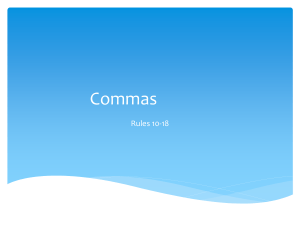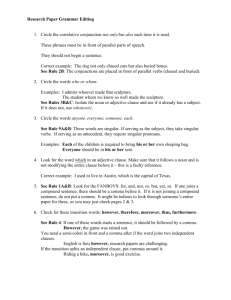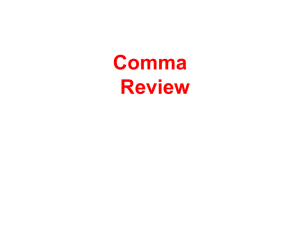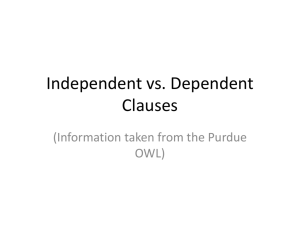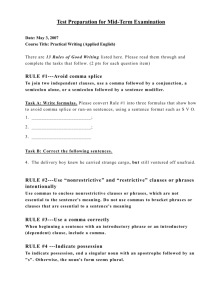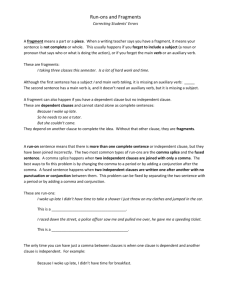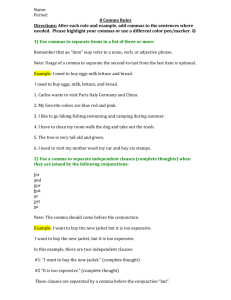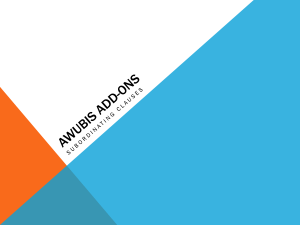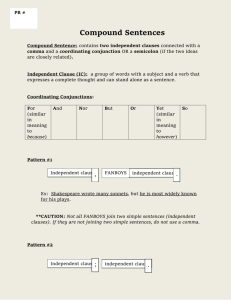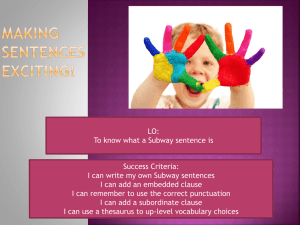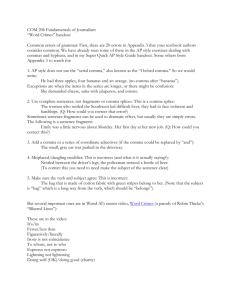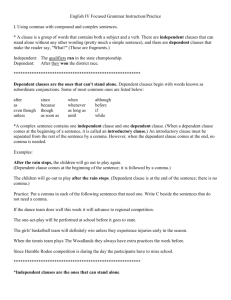Document
advertisement
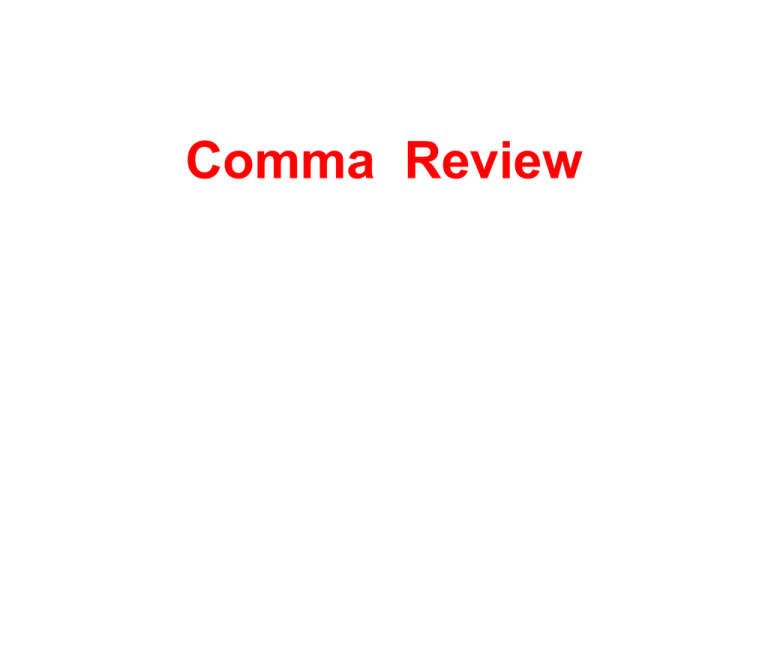
Comma Review Use commas to separate items in a list of three or more. Remember that an “item” may refer to a noun, verb, or adjective phrase. Example: I need to buy eggs, milk, lettuce, and bread. 1. Carlos wants to visit Paris Italy Germany and China. 2. My favorite colors are blue red and pink. 3. I like to go hiking fishing swimming and camping during summer. 4. I have to clean my room walk the dog and take out the trash. 5. The tree is very tall old and green. 6. I need to visit my mother wash my car and buy six stamps. Check your answers! 1. Carlos wants to visit Paris, Italy, Germany, and China. 2. My favorite colors are blue, red, and pink. 3. I like to go hiking, fishing, swimming, and camping during summer. 4. I have to clean my room, walk the dog, and take out the trash. 5. The tree is very tall, old, and green. 6. I need to visit my mother, wash my car, and buy six stamps. Use a comma to separate independent clauses (complete thoughts) when they are joined by the following conjunctions: For And Nor But Or Yet So Note: The comma should come before the conjunction. Example: I want to buy the new jacket, but it is too expensive. In this example, there are two independent clauses: #1: “I want to buy the new jacket.” (complete thought) #2 “It is too expensive.” (complete thought) Join these clauses with the conjunction "but. I want to buy a new jacket, but it is too expensive. 1. We can go to the zoo or we can go to the movie theater. 2. They like chocolate but they like vanilla better. 3. We will go to the restaurant now for we are very hungry. 4. I do not like biology or chemistry. 5. James wants to leave now yet we must wait for his little brother. 6. Terry is working on a project and should be finished with it next week. Check your answers! 1. We can go to the zoo, or we can go to the movie theater. 2. They like chocolate, but they like vanilla better. 3. We will go to the restaurant now, for we are very hungry. 4. I do not like biology or chemistry. 5. James wants to leave now, yet we must wait for his little brother. 6. Terry is working on a project and should be finished with it next week. no comma b/c no subject in the second part of the sentence Use a comma to separate a dependent clause from an independent clause when the dependent clause comes first. Here are some examples of sentences with dependent and independent clauses: 1) When I get older, I will be able to drive. à (Dependent), (Independent). 2) If you are good, I will buy you a toy. à (Dependent), (Independent). Example: Without water, the plant will die. 1. In five minutes the building will be closed. 2. When I get home I am going to brush my teeth. 3. I will not stop working until I reach my goal. 4. If I get a new job I will be very happy. 5. It takes much hard work and determination to become an astronaut. 6. Because she is only twelve she is not old enough to drive. Check your answers! 1. In five minutes, the building will be closed. 2. When I get home, I am going to brush my teeth. 3. I will not stop working until I reach my goal. no comma b/c dependent clause comes after the independent clause 4. If I get a new job, I will be very happy. 5. It takes much hard work and determination to become an astronaut. no comma b/c dependent clause comes after the independent clause 6. Because she is only twelve, she is not old enough to drive. Use a comma(s) to separate any word or phrase from the rest of the sentence that is not essential to the sentence's meaning. This phrase usually provides extra information about the subject. Here are some examples of sentences with words/phrases that are not essential to the sentence’s meaning: 1) My brother, a 26 year old male, is watching TV. 2) Amy Rivers, my best friend, is going to the mall today. 3) I am ready for my dad, a hard working man, to come home. Example: My mother, on the other hand, does not like chocolate. 1. Daniel Garrison a farmer wakes up very early. 2. Tanner my teacher is wearing a gray shirt. 3. My oldest sister Tayna is graduating this year. 4. My other roommate Larry embarrasses me because he loves dressing up like Waldo. 5. When school ends today at 3:15 p.m. we will play soccer. 6. Gold watches for example are going on sale today. 7. .The author O. Henry wrote “One Thousand Dollars.” Check your answers! 1. Daniel Garrison, a farmer, wakes up very early. 2. Tanner, my teacher, is wearing a gray shirt. 3. My oldest sister, Tayna, is graduating this year. 4. My other roommate Larry embarrasses me because he loves dressing up like Waldo. Larry is essential information because we need to know which roommate. 5. When school ends today, at 3:15 p.m., we will play soccer. 6. Gold watches, for example, are going on sale today. 7. The author O. Henry wrote “One Thousand Dollars.” O. Henry is essential information because we need to know which author. Use a comma to separate an introductory element from the rest of a sentence. Example: Hi, how are you? 1. Yes I would like more water please. 2. Although I studied I did not pass the test. 3. Well I hope the problem will be fixed soon. 4. However I am very good at math. 5. In the middle of the night the owls are awake. 6. Unfortunately we do not have enough time. 1. Yes, I would like more water please. 2. Although I studied, I did not pass the test. 3. Well, I hope the problem will be fixed soon. 4. However, I am very good at math. 5. In the middle of the night, the owls are awake. 6. Unfortunately, we do not have enough time.
